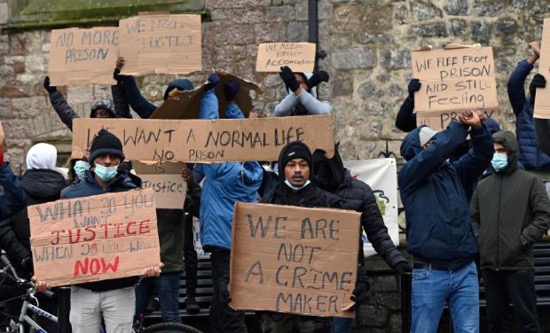
On 29 January a large fire broke out at Napier Barracks in Kent after asylum seekers being held there were told that the camp would remain locked down for another ten days and that promised transfers would not take place. The men held in the former army barracks have been staging repeated protests for the past months to draw public attention to the situation in these ‘migrant camps’ and highlight their demands to be moved to decent accommodation while their cases are processed. These protests became more urgent as Covid-19 raged through the camp unchecked. On 23 January, the weeks of hunger-strikes, banner displays and sit-outs in the freezing cold had begun to pay off as 39 older residents, men in their 40s and 50s, were moved out of the camp. The following day the Home Office announced that up to 100 men would be ‘temporarily mov[ed]… in order to allow others at Napier to self-isolate more easily.’ NICKI JAMESON reports.
Since September 2020 Napier Barracks has housed 400 adult male asylum seekers; up to 250 are located at Penally Barracks, Pembrokeshire in Wales – although the Home Office has promised that they will be relocated – and up to 100 at RAF Coltishall in Norfolk. The men in these camps come from Syria, Libya, Eritrea, Iraq, Sudan and other countries, and there is no single reason for their decisions to make the difficult and desperate journey to Britain. People are forced to migrate for many different reasons: war, persecution and poverty, climate change and environmental destruction. As an imperialist country, Britain is a player in all these and, as internationalists and socialists living in that imperialist country, we offer our solidarity to all those seeking sanctuary here.
Families separated
FRFI spoke to Adam Yasir, who regularly visits Napier Barracks using a converted camper van ‘Rosa Parked’, from which he provides material aid, legal advice and solidarity*. From the limited press coverage that the camps have received, it would seem that the men there are all single, but Adam told us that in fact many came to Britain with wives and children, from whom they have been forcibly separated by the Home Office. Although the camp is technically not a prison, Adam says that many men tell him that living conditions are worse than in prisons they have previously been detained in; on top of which they face the agonising uncertainty of not knowing what will happen to them and when they will be moved elsewhere. Residents of Penally specifically highlighted this in a ‘No to Prison’ protest on 13 January.
Napier and Penally Barracks are managed by Clearsprings Ready Homes, one of the three profiteering private companies contracted by the Home Office to house asylum seekers (the others being Serco, which runs the Norfolk facility, and the Mears Group). Day-to-day running of the camps is then further subcontracted, increasing the lack of accountability. In the case of Napier, the agents are Nationwide Accommodation Services, an east London property company specialising in managing private rental properties for local councils. Such private rentals are notorious for their dilapidation, and it is no different at the camps, where residents complain of over-crowded and insanitary conditions, including broken toilets and sinks. In addition to these physical issues, access to legal, medical and mental health support is completely inadequate. There are reported to have been at least two suicide attempts at Napier and multiple incidents of self-harm.
Covid runs wild
On 19 January Napier Barracks grew still more prison-like, as it was locked down by the Home Office and Kent police, following 100 residents testing positive for Covid. An ‘Open Letter to British Citizens from the Residents of Napier Barracks’ sent out on 22 January, describes conditions:
‘Napier Barracks has 16 blocks to house 400 asylum seekers. 3 of these have separate private rooms but the 13 others are housing around 28 people each. These 28 people share one space to sleep next to each other with partitions in between which are open from the top and curtains to secure some kind of privacy. But we are all sharing one space, we breathe in the same room and there is no way we can practice social distancing. Moreover, these 28 people in each block share 2 toilets and 2 showers in total. They also provided extra toilets and showers outside of each block but they are either out of order or have poor hygiene. Meals are usually served in the communal dining room and we all have to wait in a queue to get the food three times a day, so we also share one space to eat as well… Each infected person can spread the virus all over the block which is shared with another 27 people and this can cause a disaster as it did already.’
Solidarity with all those who fight back!
Although slow to take any Covid prevention measures inside the camps, the Home Office and its contractors were quick to use Covid to threaten protesting residents with fines and prevent support workers and volunteers entering. On 12 January, Netpol published footage of police harassing two men holding a banner adjacent to Napier Barracks and then threatening the volunteer who filmed this with arrest.
Some migrant support charities which have lobbied the government to close the camps, and which raise funds for material aid, portray the men of Napier and Penally as passive victims, but their resolution, self-organisation and militancy in the face of adversity clearly demonstrates how inaccurate this is. The promises to relocate all those held at Penally and the most vulnerable from Napier are testament to the strength of the people organising inside the camps – those at the sharp end of the system. Forcing the Home Office to keep these promises will be a continued battle, in the ongoing struggle for decent housing and asylum rights.
Fight Racism! Fight Imperialism! 280 February/March 2021
* www.instagram.com/rosa.parked.journey




